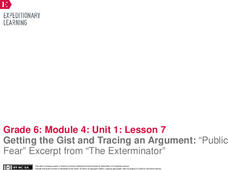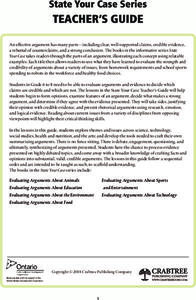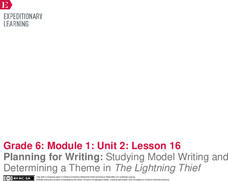NASA
Seasonal Science: Building Claims from Evidence
A lot can change in a year! Investigators observe a video of Earth over the course of a year and complete a KWL chart. Astronomers view a second video, participate in a guided discussion, and discuss the rubric for successfully...
NASA
Introduction: Building Claims from Evidence
Making a claim without supporting it has little value. Learners work on their claim-making skills in a well-designed lesson. They view still images from a video and make claims using support from the visual representations. They then...
Nemours KidsHealth
Concussions: Grades 6-8
Teach middle schoolers to learn how to prevent concussions, recognize the symptoms of a concussion, and what they should do in case of a concussion. After reading articles that provide background information, groups create factsheets...
Nemours KidsHealth
Obesity: Grades 6-8
Screen time and fast foods, sugary drinks and greasy fries have lead to one-third of tween and teens being overweight or obese. As part of the Health Problems Series scholars analyze the nutritional value of the school food services menu...
Nemours KidsHealth
Diabetes: Grades 6-8
After reading a series of articles that provide background information about Type 1 and Type 2 diabetes, class members design a meal plan and an activity plan for a weeklong summer camp for 5- to 8-year olds with diabetes. A second...
Nemours KidsHealth
Eating Disorders: Grades 6-8
Raise awareness of eating disorders with a two-activity lesson with middle schoolers reading articles to gather background information and then create audio messages and advertisements that promote healthy self-esteem and body image.
Nemours KidsHealth
Cold and Flu: Grades 6-8
Wouldn't it be lovely if people were immune from colds and flu? Alas, such is not the case; however, there are things we can do to avoid getting or spreading these pesky health hazards. Middle schoolers read articles that provide them...
Nemours KidsHealth
Asthma: Grades 6-8
Two activities teach middle schoolers about asthma and how it can affect people's lives. After reading a series of articles and watching two videos that provide background information about asthma, pupils design an interactive game that...
Nemours KidsHealth
Online Safety: Grades 6-8
Recognize risky behaviors and avoid them! That's the big idea behind two activities designed to teach middle schoolers to think critically about online safety. After reading background articles about protecting online identity,...
Nemours KidsHealth
Bike Safety: Grades 6-8
Two activities teach tweens and teens about bike safety. After reading articles about bike safety, class members design tags with important safety reminders that can be attached to bikes. Groups then create a dance video that...
Humane Education Advocates Reaching Teachers
Justice for All - Educating Youth for Social Responsibility: Grades 6-8
Teach middle schoolers how to develop healthy relationships with activities and lessons designed to create a kind and inclusive
classroom. Pupils create guidelines to develop a safe and civil learning environment. They learn how to...
EngageNY
Identifying How Text Features Support Arguments: “The Exterminator"
Half and half. Split the class in half to gain a full understanding of sidebars. Pupils work in groups to discuss sidebars in text. Half of the groups read Seriously Sick, and the other half reads Killer Genes. They read using...
EngageNY
Mid-Unit Assessment: Tracing an Argument in an Article and a Video
Pesticides—unnecessary pollutants or positive application? Learners watch a video about DDT and read Rachel Carson: Sounding the Alarm on
Pollution for their mid-unit assessment. They complete graphic organizers, answer multiple-choice...
EngageNY
Getting the Gist and Tracing an Argument: “Public Fear” Excerpt from “The Exterminator”
Only fear fear itself. Scholars read Public Fear from The Exterminator. Triads work together to annotate and determine the gist of the text. They then complete a Tracing an Argument graphic organizer to identify arguments, claims, and...
EngageNY
Annotating the Text and Identifying Argument, Claims, and Evidence: “Double Whammy” Excerpt from “The Exterminator"
That's a double whammy! Scholars read the excerpt Double Whammy from The Exterminator. After identifying the gist of the text, they annotate by marking the author's claim. The group discusses what is meant by double whammy and complete...
Crabtree Publishing
State Your Case Series
Four lessons make up a unit focused on writing persuasive essays. Each unit builds on the last, ultimately taking pupils through the writing process. Scholars make a claim, create an argument, debate both sides, then state their opinion....
EngageNY
Planning for Writing: Studying Model Writing and Determining a Theme in The Lightning Thief
A theme runs through it. Scholars analyze how a common theme runs through the myths they have read and The Lightning Thief. They complete graphic organizers and view a four paragraph model essay. They analyze the essay for structure and...
Nemours KidsHealth
Media Literacy and Health: Grades 6-8
Internet suffers could drown in the volume of information available on line. Here's an activity that can be a lifeline and buoy confidence in middle schoolers' ability to find reliable information and credible sources. After reading...
Echoes & Reflections
Contemporary Antisemitism
Despite the recognized atrocities of the Holocaust, anti-semitism continues. The 11th and final installment of the Teaching the Holocaust series explores the long-term effects of the Holocaust on modern anti-semitism, asking pupils to...
Echoes & Reflections
Perpetrators, Collaborators, and Bystanders
After the Holocaust, the world grappled with how to bring justice to the Nazis. But what to do with the thousands—if not millions—who allowed it to happen? Young historians consider the issues of guilt, collaboration, and responsibility...
Stanford University
Declaration of Independence
Scholars work in pairs to decide whether leaders wrote the Declaration of Independence for the rich and powerful or for every man. To draw their conclusion, pairs read excerpts from two historians and complete a graphic organizer citing...
The New York Times
Where to Draw the Line: Balancing Government Surveillance with the Fourth Amendment
The question of how to balance Fourth Amendment Rights with national security concerns becomes critical in an age of planned terrorist attacks, election interference, and fake news. Get young social scientists involved in the debate with...
Newseum
Putting the Consumer's Questions to Work
Who, what, when, where, why, and how are good questions to ask when evaluating a source. First, scholars find two sources of information relating to a chosen topic. Next, pupils complete a worksheet to gauge the source's credibility....
Newseum
E.S.C.A.P.E. Junk News
Fair, balanced, and reputable information? There's an acronym for that! Scholars learn the E.S.C.A.P.E. method for evaluating news sources. Then, pupils work in small groups to read and analyze a news story and discuss the activity to...

























